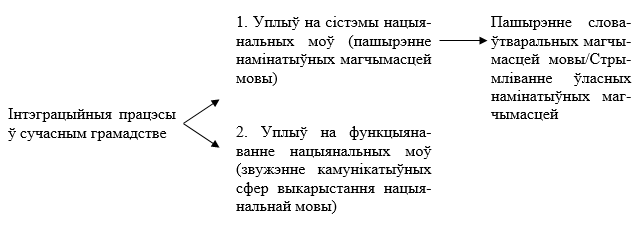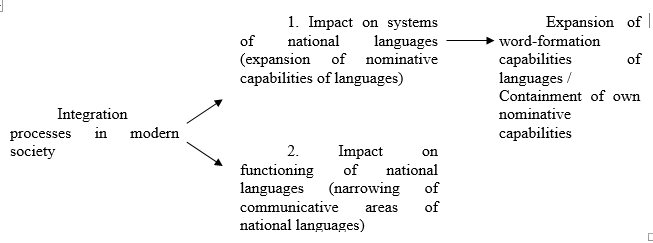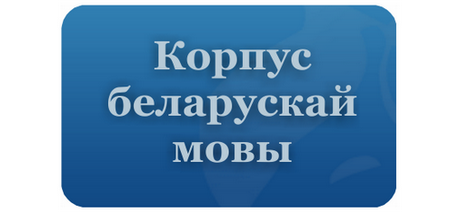Доктар філалагічных навук, прафесар Аляксандр Лукашанец
Цэнтр даследаванняў беларускай культуры, мовы і літаратуры НАН Беларусі
Мінск, Беларусь
Мэта даследавання.
Мэтай даследавання з’яўляецца ўстанаўленне сутнасці ўплыву працэсаў глабалізацыі на сістэмы сучасных славянскіх моў і іх функцыянаванне ў нацыянальных соцыумах; вызначэнне асноўных тэндэнцый развіцця сістэмы словаўтварэння славянскіх моў; тыпалогія інавацыйных працэсаў у славянскім словаўтварэнні і іх ролі ў развіцці нацыянальных лексіконаў славянскіх моў, а таксама распрацоўка крытэрыяў іх ацэнкі.
Выкарыстаныя метады вырашэння пастаўленых задач
Даследаванне будуецца пераважна на беларускім моўным матэрыяле з прыцягненнем фактаў іншых славянскіх моў. Крыніцай фактычнага матэрыялу паслужылі сучасныя слоўнікі беларускай мовы, у тым ліку «Беларуска-рускі тлумачальны слоўнік новых слоў і новых значэнняў слоў» (Мн., 2013), Нацыянальны корпус беларускай мовы, а таксама беларускамоўныя інтэрнэт-рэсурсы. Пры даследаванні былі выкарыстаны апісальны і параўнальна-супастаўляльны метады, метад сінхроннага словаўтваральнага аналізу.
Асноўныя вынікі
Глабалізацыя – сусветны працэс палітычнага, эканамічнага, культурнага і духоўнага аб’яднання і ўзаемапранікнення – знаходзіць сваё праяўленне ва ўсіх сферах жыцця сучаснага грамадства (https://www.calc.ru/Globalizatsiya-Protsess-I-Posledstviya.html) і самым непарэдным чынам уплывае на нацыянальныя мовы і іх функцыянаванне ў нацыянальных соцыумах.
З сучаснымі працэсамі глабалізацыі звязана актыўнае пранікненне сусветных моў, у першую чаргу англійскай, у сферу ўнутрынацыянальнай камунікацыі, што ў перспектыве можа ствараць пагрозу выцяснення нацыянальных моў на этнакультурную перыферыю.
Працэсы глабалізацыі таксама непасрэдна ўплываюць на сістэмы нацыянальных моў, у першую чаргу на іх лексічны склад і словаўтварэнне.
У сферы славянскага словаўтварэння моўная глабалізацыя знаходзіць сваё выражэнне ў:
а) інтэнсіўным пашырэнні словаўтваральнай базы за кошт уключэння англамоўных запазычанняў у словаўтваральны працэс (камп’ютар – камп’ютаршчык, камп’ютарны, камп’ютарызаваць, камп’ютарызацыя і г.д.);
б) істотным павеліченні аб’ёму матываванай лексікі з іншамоўнымі асновамі і актуалізацыяй словаўтваральных сродкаў іншамоўнага паходжання (напрыклад, інтэрнэт – інтэрнэтчык, інтэрнэтны, інтэрнэт-камунікацыя, інтэрнэт-магазін, інтэрнэт-канферэнцыя і г.д.);
в) пашырэнні рэестра словаўтваральных спосабаў і сродкаў (напрыклад, гібрыднае словаўтварэнне: VIP-персона) і г.д.
Адзначаныя працэсы забяспечваюць патрэбы намінацыі, аднак вядуць да істотнай інтэрнацыяналізацыі лексіконаў сучасных славянскіх моў, нівеліравання іх нацыянальнай адметнасці і стрымлівання ўнутраных намінацыйных магчымасцей.
Адваротны бок уплыву працэсаў глабалізацыі на славянскае словаўтварэнне, т. зв. “антыглабалізацыя” знаходзіць сваё ўвасабленне ва ўзмацненні моўнага этнапурызму і актывізацыі ўласных словаўтваральных рэсурсаў мовы: сеціва = інтэрнэт, далькажык = мабільнік ‘мабільны тэлефон’, пляцак = рукзак і інш.
Суіснаванне ў лексіконах славянскіх моў англамоўных запазычанняў і вытворных на іх базе адзінак, з аднаго боку, і спрадвечнай, у тым ліку вытворнай, лексікі, з другога, вядзе да канкурэнцыі словаўтваральных тыпаў і стылістычнай дыферэнцыяцыі сінанімічных намінатыўных адзінак.
Мэтазгоднасць праведенага даследавання, яго арыгінальнасць
У даследаванні паказваецца месца інавацыйных працэсаў у словаўтварэнні сучасных славянскіх моў у агульным кантэксце моўнай глабалізацыі, характарызуюцца праявы “антыглабалізацыі” як тэндэнцыі да нацыяналізацыі і моўнага этнапурызму.
Вывады
1. Сучасныя працэсы глабалізацыі закранаюць не толькі сістэмы нацыянальных моў, але і ўплываюць на іх функцыянаванне ў нацыянальным соцыуме. Інавацыйныя працэсы ў словаўтварэнні сучасных славянскіх моў з’яўляюцца толькі адной з праяў моўнай глабалізацыі.
2. Працэсы глабалізацыі ў славянскім словаўтварэнні характарызуюцца супярэчлівасцю і неадназначнасцю ацэнак. З аднаго боку, актыўнае папаўненне лексіконаў славянскіх моў іншамоўнай лексікай і яе ўключэнне ў словаўтваральны працэс забяспечвае патрэбы сучаснай намінацыі і пашырае словаўтваральныя магчымасці мовы. З другога боку, абмяжоўвае рэалізацыю ўласнага намінатыўнага патэнцыялу, у тым ліку і словаўтваральнага.

3. Неабходна бачыць і адваротны бок працэсу глабалізацыі ў славянскім словаўтварэнні – своеасаблівую “антыглабалізацыю”. Інтэнсіўнае папаўненне сучасных лексіконаў славянскіх моў цэлымі гнёздамі вытворных слоў на базе іншамоўных запазычанняў стымулюе актывізацыю ўласнага намінітыўнага патэнцыялу і вядзе да паралельнага ўтварэння аналагічнага раду вытворных адзінак на базе нацыянальных моўных рэсурсаў. Вынікам гэтага становіцца істотнае пашырэнне лексічнай і словаўтваральнай сінаніміі, а таксама стылістычнае размежаванне запазычанай і спрадвечнай лексікі, у тым ліку вытворнай.
4. Асноўнымі крытэрыямі сучасных дынамічных працэсаў у словаўтварэнні славянскіх моў трэба лічыць: а) адпаведнасць агульным тэндэнцыям моўнага развіцця, б) актуальнасць; в) намінатыўную мэтазгоднасць; г) уключанасць у сістэму.
Aliaksandr А. Lukashanets
Manifestations of Language Globalization in the Slavic Word-Formation: Their Nature, Scope and Impact on the System
Prof. D.Sc Aliaksandr Lukashanets
Center for the Belarusian Culture, Language and Literature Research
of the National Academy of Sciences of Belarus
Minsk, Belarus
The purpose of the study.
The study aims at defining the essence of globalization processes influence on the systems of modern Slavic languages and their functioning in national societies; determining the major development trends of the word-formation system of Slavic languages; considering the typology of innovation processes in the Slavic word-formation and their role in the development of national lexicons of Slavic languages, as well as elaborating criteria for their evaluation.
The methods used to achieve the objectives
The study is based mainly on the Belarusian language material, some facts of other Slavic languages being involved. Modern dictionaries of the Belarusian language, including “Беларуска-рускі тлумачальны слоўнік новых слоў і новых значэнняў слоў” (“Belarusian-Russian Explanatory Dictionary of New Words and New Meanings of Words”) (Minsk, 2013), the National Corpus of the Belarusian Language and some Belarusian-language Internet resources, were a source of factual material. Descriptive and comparative methods, as well as the method of synchronous word-formation analysis were used for the study.
The main results
Globalization being a global process of political, economic, cultural and spiritual unification and interpenetration is manifested in all spheres of modern society (https://www.calc.ru/Globalizatsiya-Protsess-I-Posledstviya.html). It directly affects national languages and their functioning in national societies.
Modern processes of globalization are associated with the active penetration of world languages, primarily English, into the sphere of national communication, and this fact may create a threat of national languages displacement to the ethno-cultural periphery in the future.
The globalization processes also directly affect the systems of national languages, primarily their vocabulary and word-formation.
In the field of Slavic word-formation, language globalization is manifested in:
а) intensive expansion of the word-formation base by including English borrowings in the word-formation process (камп’ютар – камп’ютаршчык, камп’ютарны, камп’ютарызаваць, камп’ютарызацыя, etc.);
б) significant increase in amount of motivated words with foreign stems and actualization of word-formation means of foreign origin (i.e., інтэрнэт – інтэрнэтчык, інтэрнэтны, інтэрнэт-камунікацыя, інтэрнэт-магазін, інтэрнэт-канферэнцыя, etc.);
в) expansion of the list of word-formation methods and means (i.e., hybrid word-formation: VIP-персона), etc.
The above-mentioned processes provide the needs of nomination. However, they lead to significant internationalization of vocabularies of modern Slavic languages, levelling their national identity and containment of internal nominative capabilities.
The reverse impact of globalization processes on the Slavic word-formation, namely so-called “antiglobalization”, is manifested in the strengthening of linguistic ethnopurism and the activation of the languages own word-formation resources: сеціва = інтэрнэт, далькажык = мабільнік ‘a mobile phone’, пляцак = рукзак, etc.
The coexistence of English borrowings and their derivatives in lexicons of the Slavic languages, on the one hand, and primordial vocabulary, including derivatives, on the other hand, leads to competition of word-formation types and stylistic differentiation of synonymous nominative units.
The expediency of the study, its originality
The study indicates the place of innovation processes in the word-formation of modern Slavic languages in the overall context of language globalization. It also characterizes manifestations of “antiglobalization” as the trend toward the nationalization and linguistic ethnopurism.
Conclusions.
1. Modern globalization processes affect not only systems of national languages, but also their functioning in national societies. Innovation processes in word-formation of modern Slavic languages are only one of the manifestations of language globalization.

2. Inconsistency and ambiguity of estimates are characteristic of the globalization processes in the Slavic word-formation. On the one hand, the active replenishment of Slavic lexicons with foreign vocabulary and inclusion of foreign units in the word-formation process provides the needs of modern nomination and expands the word-formation capabilities of languages. On the other hand, it limits the realization of the languages own nominative potential, including the word-formation one.
3. One should also see the reverse side of the globalization process in the Slavic word-formation, namely a kind of “antiglobalization”. The intense replenishment of the modern Slavic languages with word-formation nests of derivatives based on foreign borrowings stimulates the activation of the own nominative potential of these languages and leads to the parallel formation of the analogous derivatives based on the national language resources. It results in a substantial expansion of the lexical and word-formative synonymy and in stylistic differentiation between borrowed and primordial vocabulary, including a derived one.
4. We distinguish the following major criteria of modern dynamic processes in the word-formation of Slavic languages: a) compliance with the overall trends of language development; b) relevance; c) nominative expediency; d) inclusion in the system.







